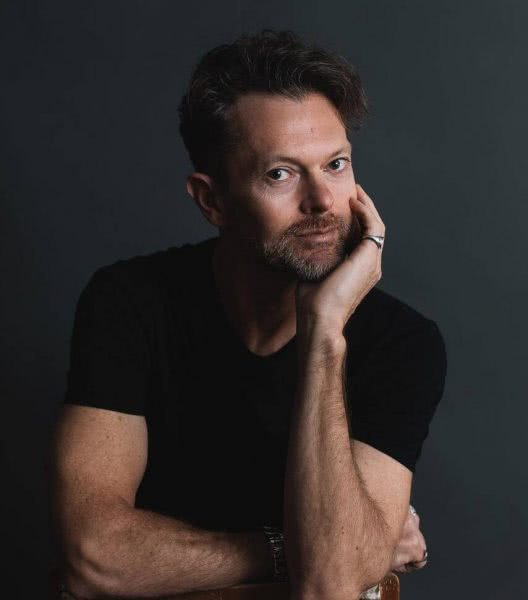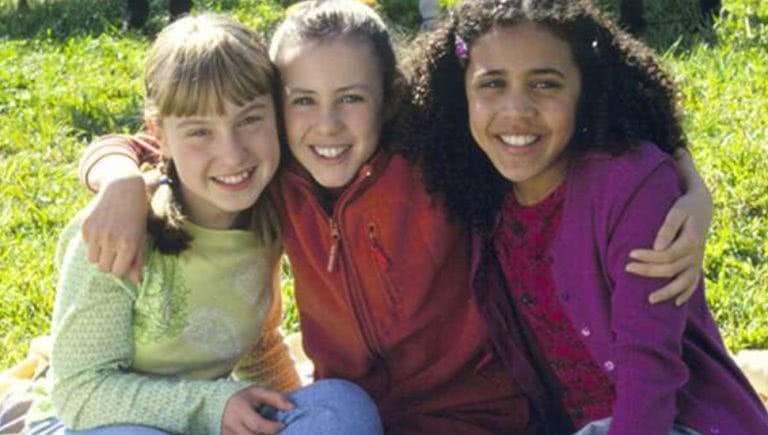The Saddle Club has long remained one of our favourite TV shows of yesteryear, and for very good reason.
The certified childhood classic featured the perfect combination of wish-fulfilling storylines and relatable plot points.
It was unashamedly earnest, unmistakeably Australian and above all, utterly addictive.
One of the most beloved elements of the show was its music, which went on to experience unprecedented popularity in its own right.
Yep, the show’s OG lead actors Keenan MacWilliam, Sophie Bennett and Lara Jean Marshall achieved actual ARIA chart success with their spin-off singles and albums. In fact, the first three records released under The Saddle Club umbrella achieved gold record status.
You’d be hard-pressed to find a tween in the early 2000s so didn’t have at least one Saddle Club CD on high rotation on their walkman.
But who was actually behind all the music, you may wonder?
Well, Dale Cornelius was certainly one of the key players from the very beginning.
The screen composer was hired to revamp ‘Hello World’ into the banger we know it to be today, after it was originally released by a mysterious European singer (seriously, not even an extensive Google search has revealed the identity of the original artist).
Not only that, but he also composed all of the underscore music which featured through the show’s first few seasons.
As if that wasn’t enough, he wrote songs for the debut album Fun For Everyone including ‘Here I am’ and ‘Dreams Come True’.
It’s not an exaggeration to say Cornelius heavily contributed to crafting the show’s identity in what was one of his very first jobs in the industry.
Since then, he has gone on to compose music for a plethora of Aussie shows and movies, including Mary and Max, The Real Housewives of Melbourne and Sydney and The Doctor Blake Mysteries.
However, he says his work on The Saddle Club is still one of the things people are most impressed by, even some 20 years later.
As part of our series where we interview the people behind some of TV’s most memorable tunes, we caught up with Cornelius to discuss his memories from working on the show and the key to great screen music.

How did you end up becoming involved with the show?
I got introduced to the production company, Crawford Productions through my agent at the time. I’m not sure how they came across the original ‘Hello Word’, but I know that they struck a deal with Shock Records and it could have been part of their catalogue. When I first heard it I was like, really? You want this song for this show about girls and their ponies?
How did you go about revamping ‘Hello World’ into the classic theme tune we all know and love?
The biggest challenge with it was turning what sounded like a pretty obscure Swedish Eurovision-Esque pop song into something that would resonate with The Saddle Club and be memorable. It needed to be something people would associate with the show and nothing else. That came through the instrumentation that I used. They wanted the actors to sing it, they wanted them to be involved in all that because they had aspirations to develop other songs which ended up being in the album release that I worked on.
Crawford Productions wanted to make a classic show. They made Black Beauty around the 1960s and it was still playing around the world 20 or 30 years later, so they wanted to emulate that. True to their word, I still get royalty checks from the show still airing around the world, it’s crazy.
What are some of your strongest memories from working on music for the show?
It was at the start of my career, I didn’t have a studio or anything, I was still composing out of my house. All of a sudden we had to do these recording sessions with the girls, so we literally stripped the whole back section of my house and turned it into a makeshift recording studio. We prepared for writing all the underscore music in the series, as well as the recording session for the opening and closing credits.
The girls got dropped off to my house by their parents. They were really wide-eyed and filled with the possibility that this could be really successful. Of course, everyone wanted to sing the lead line. That was challenging because they all had different vocal abilities. We had to try to tap into everyone’s different strengths and focus on that. I hope they were happy with the roles that they had, but I remember a lot of talking and negotiating over who would get which line to sing. It was a really fun time because I’d never done anything like that before. The results ended up being that the song became really popular, which led to other songs being written for them by me and a bunch of other songwriters.
You’ve worked on a really wide range of TV shows, from animation to documentaries and reality TV, what do you think it takes to write great music?
Across all my work, I think it’s just about creating something that is unique to that show that gives it an identity. I remember on Doctor Blake before the show started, they were like, ‘we want a TV theme for this show that when people hear it, even if they’re not in the same room as the TV, they’ll quickly finish whatever they’re doing and rush to watch the show’. I was like, ‘oh, that’s very old school’, with streaming now I didn’t think that was as relevant. But what is relevant is the thought behind it, how music can be such a powerful influence on the show itself. It can inform the rest of the show.
As an adult man, how did you go about coming up with songs that young girls could connect with? What was your process?
I would have been about 28-30 at the time, so compared to now, it didn’t seem like too much of a stretch to think back to being a teenager and the things that me and my friends were thinking about. Talking about it today, it seems really wrong that it wasn’t a whole bunch of female songwriters who were commissioned to work on it instead, because they could speak more authentically to a teenage girl. I’m very aware of that now, but of course, back then I just wanted the gig!
I wanted to try and tap into the sorts of things I was thinking about at that time, and what girlfriends talked to me about when we were at school. The Saddle Club‘s showrunner Lynn Bayonas really helped me tap into the community of young horse riders as well. She was brilliant because she helped me with the whole mindset of the girls, what they were experiencing and their backgrounds. That was part of my job, to really ask a lot of questions about the characters themselves in order to create something that made sense for them to sing.
Most of my work now is instrumental, not songwriting, but when I have been asked to write songs, it’s about understanding that moment in relation to the story in the film or TV show and what the characters are going through. Sometimes it needs to be pretty obvious, and other times it can be not too on the nose lyrically. I really dread lyrics, to be honest, I’d rather work with a lyricist and come up with the music. But yeah, just trying not to be too literal. My preference is to create things that serve the story and serve the experience of the audience while watching the show or movie.
How does working in screen composing affect your TV watching experience?
If everything’s working in the show, then I can totally enjoy it, but I’m probably more aware of the components. If one component isn’t working so well, then that will pull me out very quickly from what I’m watching. What I have noticed with friends and people that are close to me, invariably they all end up inadvertently becoming so much more aware of what they are watching, especially the music. They suddenly realise just how vastly important the music is. When it’s functioning really well, you won’t notice it.
What did you learn about screen composing from your time on The Saddle Club?
It was my first show, and I didn’t quite realise how brutal TV can be with schedules. It was a baptism of fire with just how much music had to be created in such a short period of time, it was pretty intense. I think there was that side of it, like learning what the industry was like and adapting. Also, getting to learn how all the other bits of the production wheel worked. The show was a machine, it stopped for no one and just kept going. All the cogs of the machine had to be functioning really well. Little upsets from different areas would impact the whole product, and I don’t think I fully realised that until working on that show. So, it was great for my personal development as a screen composer.
You’ve told me that people still get excited when you say you worked on The Saddle Club, what do you think it is about the show and its music that makes it resonate to this day?
Yes, it was relentlessly popular, and it was a big thrill to see it exploding. Every now and then I still will get an email like, ‘we loved The Saddle Club, we loved the music, how do we find the music’ and so forth.
I just don’t think there was any other local content for girls in particular of that age at the time. Obviously, the horse community was one thing, but its appeal was much wider than just girls who already had that privilege. I think it just provided a screen community in a way, something for teenage girls where it provided what they wanted. I think It had pretty wholesome values, the girls had to stick together and learn the value of supporting each other through what can be a pretty challenging time during those early teenage years.
What does your career look like now?
I think it’s more diverse than it’s ever been, I’m heavily involved in screen music for a variety of things. In the last couple of years, I’ve also been developing my own music for the first time. It’s been a great opportunity to finally expand into areas that I’m interested in exploring for myself. I’m also a board director on the Australian Guild of Screen Composers, so I’m doing a lot of work in the sector in bridging the gap between tertiary and the professional screen sector. I also help in developing initiatives and programs to try to encourage diversity in the screen sector. We also lobby the government in various ways to try to keep the sector alive, because it’s struggling more than it ever has at the moment in the current climate.
Revisit the iconic Saddle Club theme song ‘Hello World’:



































